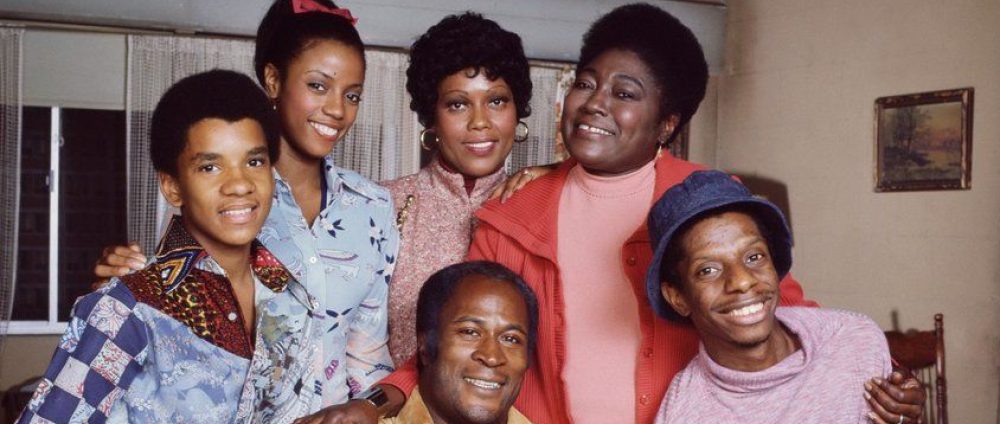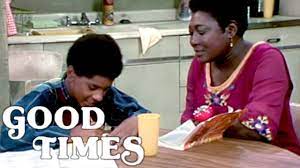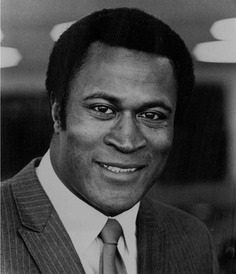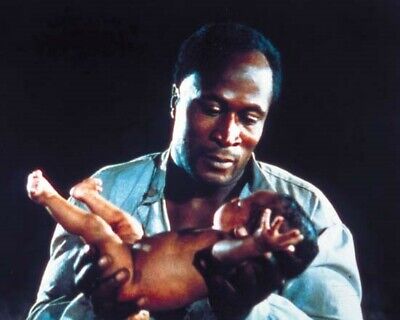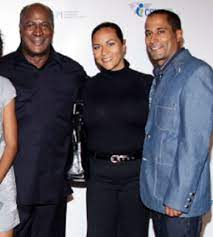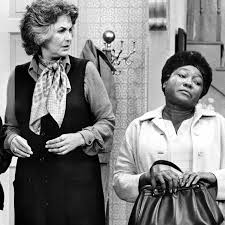
Before I decided to create this blog, I’d planned to write a book on Good Times. In my (never-sent) book proposal from 2022, I mentioned the continuing popularity of the show as indicated by the numerous Facebook groups, and its ongoing relevance, evidenced by the then-upcoming animated series being developed by Norman Lear.
That animated series – called Good Times: Black Again – launched on Netflix on April 12th with a cast that includes Yvette Nicole Brown, Godfrey, Lil Rel Howery, Marsai Martin, Ego Nwodim, Rashida Olayiwola, Jay Pharoah, J.B. Smoove, Cree Sumner, and Wanda Sykes. Since it premiered, I’d seen numerous comments on Facebook, Twitter, and TikTok. Most were not favorable. And that’s putting it mildly. But I had to check it out for myself.

The show’s pilot, entitled “Meet the Evans of New,” informs us of a few facts that I hadn’t previously known, primarily that the show is not a reimagining of the original although it does consist of a mother, a father, and three children – two boys and a girl – living in a Chicago housing project. But the father in Black Again – Reggie Evans – is actually the grandson of James and Florida Evans. This detail notwithstanding, the animated version resembles the original in several ways: the oldest son – Junior – is an artist and is not the sharpest knife in the drawer, academically speaking; Junior frequently squabbles with his sister, the middle child, whose name is Grey; and one of the children, who is an excellent student, also has a militant, politically aware persona. (The difference is that in the animated version, those characteristics are assigned to Grey, instead of the youngest child.) The animated Evans family also lives in the same apartment as the Good Times Evans: 17C; they even have the same triangle-shaped mirror and curtain-for-a-door closet in the front room.
After reading the comments on social media, I was primed to dislike the series, but I tried to keep an open mind. But to be honest, I was turned off by the opening title sequence! The new theme song is fine – it includes lyrics like, “Head above water, makin’ a way . . . Keep my family close, pick me up when I’m low, help me down on this road and I’ma bring us back home again . . .” But I didn’t care for the graphics, which included a close-up of a woman’s sizable rear sashaying down a city street and a baby with dyed blonde hair, a pacifier on a gold chain, and diamond earrings in each ear shooting craps on the street.
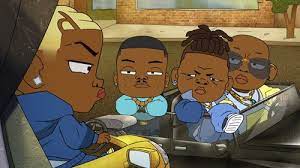
It turns out that the blonde-haired, earring-wearing tyke from the title sequence is Dalvin, the family’s youngest child – a drug-dealing baby who has been kicked out of the house by his father. When we first see him, he’s selling drugs from his stroller on a street corner. When a car full of rapper-babies pull up, insisting that he give up his corner, he refuses, and they actually start SHOOTING AT HIM. Later, he snorts powdered formula like it’s cocaine. And he keeps a gun in his diaper.
But I’m getting ahead of myself. Let me begin with the pilot’s very first scene, which shows Reggie Evans in the shower, warbling a few lines from the original show’s theme song. But it’s not a solo performance, y’all – it’s a duet. WITH. A. COCKROACH. It’s not a great start.

The plot of the pilot contains references to episodes from the original show – Junior paints a picture of Black Jesus on the living room wall, the mother – Beverly – is readying the apartment for the building’s beautification contest, and Reggie – attempting to raise money to help with his wife’s beautification efforts – takes his pool cue to the local billiard hall. (He refuses to take money from his drug-dealing baby and instead, takes Junior with him, saying, “I’m gonna show you how a man takes care of his family in a respectable way.”)
In the remainder of the episode, we meet Bev’s best friend, Lisa, who runs a beauty salon; Grey goes on a hunger strike to draw attention to the use of chemicals in food products; and Bev is told by Delphine, the head of the beautification judging committee, that the criteria has been expanded from previous years, and that they are taking a “more holistic approach.” (Incidentally, after this declaration, we cut to three scantily clad women clustered nearby; one of them says, “Y’all hear that, hoes? We got a shot to win.” And Delphine explains, “Not that kind of HOE-listic.” Hardee har har.) Because the beautification judges will now take “the family unit” into consideration, Bev prays to Black Jesus for the return of her son, Dalvin, to the fold, promising to get him baptized if he does. Before long, Dalvin does, indeed come back home – because he’s seeking sanctuary from the baby-rappers who are shooting at him.

Meanwhile, in the pool hall, Reggie encounters a man – Minnesota Matt – whose grandfather lost his last $72 to James Evans in a pool game years before. It was all the money he had, his wife left him, and Matt wants a revenge rematch. This is another callback to the original series as, in the pilot of that show, the Evans family needed exactly $72 in order to avoid eviction from their home, and James Evans took to the local pool hall to get the money.
Let me try to wrap this thing up. Dalvin runs away from his mother (who, for some reason, was having him baptized in Lisa’s beauty salon) and gets picked up by the baby rapper shooters. Reggie is playing pool when he gets a call from Bev that Dalvin has been kidnapped and he leaves. Bev’s leaking boobs (because she’s still nursing) lead her to Dalvin and Reggie spanks the rapper babies with a belt, but one of them cuts the belt with a knife. Junior steps in with a broken pool cue and beats them all.
The family returns home too late to be considered in the contest, but Bev philosophizes, “I thought our family had to win this stupid contest to prove we were just as good as the Evans of old. Truth is, we’re the Evans of New.” (We have a title!) A short time later, Delphine returns, says her clock was wrong, and gives Bev the winning trophy. When she leaves, we see that she is being held at gunpoint by Dalvin, who also forces her to give him the keys to the building’s penthouse, where he intends to stay.
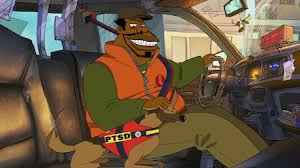
At the end of the episode, a safe falls through the ceiling, from Dalvin’s apartment onto the Evans’s dinner table, and Reggie closes things out with “Damn Damn Damn!” – the final homage (and I use the word loosely) to the original series.
I don’t want to belabor this thing, but I also checked out episodes two and three. Let me give y’all a few highlights (or lowlights, as the case may be):
- We learn from Bev that Reggie’s favorites are takis, dark liquor, and Mexican corn on a stick wrapped with a chitlin.
- Junior’s teacher (whose name, incidentally, is Mrs. Idontgiveashit) meets with Reggie and Bev because of Junior’s “lack of focus” in class. During the meeting, she’s smoking a cigarette and slurping from a flask.

- Junior and Grey have a contest to see who will get the best grades on an upcoming test. The loser has to pick the roaches out of the cereal. Continuing with the roach theme, in another scene, Junior reminds his father that he’d told the children they couldn’t have a dog “because the roaches were our pets.”
- Grey takes her exam and tells her parents: “The only person who can score higher on that test is Wendy Williams on Memorial Day weekend.” (I don’t even know what this means. I’m not sure I WANT to know what this means.)
- Grey gets her period for the first time. When she and her mother see blood staining her pajamas, they both have the same reaction: “Please let her be shot!” Bev’s rationale is because now that she’s gotten her period, Grey can get pregnant.
- Bev insists that Grey use sanitary napkins instead of tampons because “they’re a gateway. First tampons, then who knows what you’re sticking up there?”
- At school, Grey stains her clothes and her mother shows up to help. They find that there are no sanitary napkins in the bathroom dispenser, and when Grey reaches for the tampons, Bev objects: “Read my lips. No tampons. Next thing you know, you’ll end up giving birth in a public restroom and your life as you know it will be over.” And THEN, we see the feet of a girl in a nearby stall and, as indicated by the closed captions, we get this:
[girl] Hey!
[water bubbling]
[baby crying]
And Bev says, “Well, if the stall fits!”
And that, for me, was the last straw. I couldn’t reach for the remote control fast enough.
I don’t even know where to begin to tell you how appalled I was by this show. Even if I wasn’t a huge fan of the original Good Times, I would be repulsed, but the fact that it serves to desecrate the name of a show that has such meaning for me – it’s just too much. I honestly cannot believe that this crap was allowed to reach the airwaves. And believe me, “crap” is putting it mildly.

It seems that every few seconds, I was witnessing a ridiculously offensive sight or hearing an unbelievably insulting line. I don’t put anything past Seth MacFarlane – the brains (or whatever) behind shows like American Dad and Family Guy – but I’m really saddened to know that before his death last year at the age of 101, Norman Lear put his stamp of approval on this garbage. Maybe I shouldn’t be surprised. But what DOES surprise me is that NBA basketball star Stephen Curry, along with MacFarlane and Lear, was also an executive producer. Surely, he could have stepped up and had a say. Surely, he read the scripts and could have pulled out a red pen. Surely, he found SOMETHING about this series that left him feeling as disgusted as I was. But maybe the dollar signs provided a more salient inspiration than his conscience.
I know, from reading online comments, that there are those who think this series is funny, but I just can’t, y’all. I was far too offended.
Far, far too offended.
